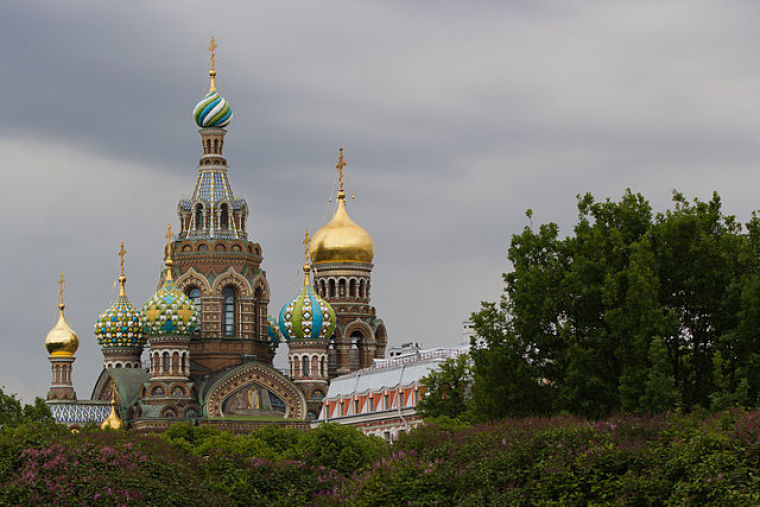Number of atheists in Russia drops by 13 percent in 3 years

The number of Russians who identify as atheists has dropped by half in just three years, according to a recent study.
The study, conducted by the Levada Research Center in late June, revealed that the number of Russian atheists fell from 26 percent in 2014 to 13 percent in 2017. As many as 44 percent described themselves as "quite religious," while 33 percent said they are "not too religious." Nine percent of the respondents considered themselves "very religious."
Religious believers now make up 86 percent of the Russian population, with Orthodoxy remaining as the most popular religion. Over 92 percent of the respondents view the Orthodox church with "respect and benevolence." Seventy-four percent said the same about the Catholic church, but 10 percent said they have "conflicted feelings" towards Catholics. Another five percent view Catholics with "dislike" or "fear."
As many as 59 percent of the respondents have a favorable view of Islam, while 17 percent have "conflicted feelings" toward Muslims, and 13 percent view them with "dislike" or "fear."
The same poll showed that 63 percent of Russians describe their attitude to atheists as "good and respectful," with eight percent stating negative feelings towards the group.
Regarding Jewish people, 55 percent of the respondents said they had a good attitude towards the group, with 17 percent reporting controversial feelings and 11 percent saying they had negative sentiments.
The survey was conducted on a representative all-Russian sample of urban and rural population among 1,600 adults in 137 settlements in 48 regions of the country.
Analysts from Levada noted in comments published on the group's website that while the share of religious people had increased, the strength of their faith had apparently weakened.
"The increase in the number of believers is not accompanied by sincere faith or understanding of importance of the religion for spiritual life," the comments read, as reported by Russia Today.
"Indirectly, the weakness of Orthodox Christian norms can be confirmed by growing opposition to restrictions imposed during major fasts – such as the restrictions on entertainment, alcohol or sex. The number of people who say that they are not ready to bear this burden has increased up to two times over the past few years," it continued.
Levada, which is a non-governmental Russian research center, has been declared by Russia's Ministry of Justice as a "foreign agent" last fall, just two weeks before the parliamentary elections. All the other main polling centers in the country are controlled by the Russian government, according to TRU News.
Lev Gudkov, the director of the research center, said that the measure amounted to political censorship.
"This practically means the imposition of political censorship and the impossibility of independent polls. It's the typical behavior of this repressive regime," he said.
 Christians don't have to affirm transgenderism, but they can’t express that view at work: tribunal
Christians don't have to affirm transgenderism, but they can’t express that view at work: tribunal Archaeology discovery: Medieval Christian prayer beads found on Holy Island
Archaeology discovery: Medieval Christian prayer beads found on Holy Island Presbyterian Church in America votes to leave National Association of Evangelicals
Presbyterian Church in America votes to leave National Association of Evangelicals Over 50 killed in 'vile and satanic' attack at Nigerian church on Pentecost Sunday
Over 50 killed in 'vile and satanic' attack at Nigerian church on Pentecost Sunday Ukrainian Orthodox Church severs ties with Moscow over Patriarch Kirill's support for Putin's war
Ukrainian Orthodox Church severs ties with Moscow over Patriarch Kirill's support for Putin's war Islamic State kills 20 Nigerian Christians as revenge for US airstrike
Islamic State kills 20 Nigerian Christians as revenge for US airstrike Man who served 33 years in prison for murder leads inmates to Christ
Man who served 33 years in prison for murder leads inmates to Christ


 Nigerian student beaten to death, body burned over ‘blasphemous’ WhatsApp message
Nigerian student beaten to death, body burned over ‘blasphemous’ WhatsApp message 'A new low': World reacts after Hong Kong arrests 90-year-old Cardinal Joseph Zen
'A new low': World reacts after Hong Kong arrests 90-year-old Cardinal Joseph Zen Iran sentences Christian man to 10 years in prison for hosting house church worship gathering
Iran sentences Christian man to 10 years in prison for hosting house church worship gathering French Guyana: Pastor shot dead, church set on fire after meeting delegation of Evangelicals
French Guyana: Pastor shot dead, church set on fire after meeting delegation of Evangelicals ‘Talking Jesus’ report finds only 6% of UK adults identify as practicing Christians
‘Talking Jesus’ report finds only 6% of UK adults identify as practicing Christians Mission Eurasia ministry center blown up in Ukraine, hundreds of Bibles destroyed: 'God will provide'
Mission Eurasia ministry center blown up in Ukraine, hundreds of Bibles destroyed: 'God will provide' Church holds service for first time after ISIS desecrated it 8 years ago
Church holds service for first time after ISIS desecrated it 8 years ago Burger King apologizes for 'offensive campaign' using Jesus' words at the Last Supper
Burger King apologizes for 'offensive campaign' using Jesus' words at the Last Supper Uganda: Muslims abduct teacher, burn him inside mosque for praying in Christ’s name
Uganda: Muslims abduct teacher, burn him inside mosque for praying in Christ’s name